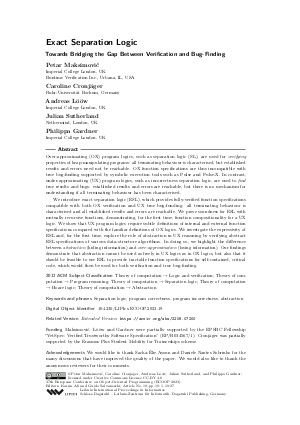@InProceedings{maksimovic_et_al:LIPIcs.ECOOP.2023.19,
author = {Maksimovi\'{c}, Petar and Cronj\"{a}ger, Caroline and L\"{o}\"{o}w, Andreas and Sutherland, Julian and Gardner, Philippa},
title = {{Exact Separation Logic: Towards Bridging the Gap Between Verification and Bug-Finding}},
booktitle = {37th European Conference on Object-Oriented Programming (ECOOP 2023)},
pages = {19:1--19:27},
series = {Leibniz International Proceedings in Informatics (LIPIcs)},
ISBN = {978-3-95977-281-5},
ISSN = {1868-8969},
year = {2023},
volume = {263},
editor = {Ali, Karim and Salvaneschi, Guido},
publisher = {Schloss Dagstuhl -- Leibniz-Zentrum f{\"u}r Informatik},
address = {Dagstuhl, Germany},
URL = {https://drops.dagstuhl.de/entities/document/10.4230/LIPIcs.ECOOP.2023.19},
URN = {urn:nbn:de:0030-drops-182123},
doi = {10.4230/LIPIcs.ECOOP.2023.19},
annote = {Keywords: Separation logic, program correctness, program incorrectness, abstraction}
}

 Creative Commons Attribution 4.0 International license
Creative Commons Attribution 4.0 International license


